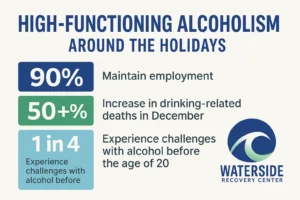The worst part wasn’t the drinking. It wasn’t the nights I couldn’t remember, the mornings I barely made it to work, or the quiet dread that followed me around like a second shadow.
It was the performance. The smiling. The thank-you notes. The well-wrapped gifts. The “I’m fine” that came too easily, too often.
I wasn’t falling apart in any obvious way. But I also wasn’t okay—and hadn’t been for a long time.
And if you’d seen me at that time—around the holidays, in full cheer mode—you probably would’ve said I looked great.
That’s the thing about high-functioning addiction: it hides in plain sight. And the holidays? That’s when the mask gets heaviest.
I Was the Person Everyone Could Count On—Except Myself
I worked full-time. Hit my deadlines. Showed up at every family function. My clothes were clean, bills were paid, and my holiday cards were mailed early. I even brought the damn pie.
But behind closed doors, it was another story.
Drinking had gone from something I did to unwind… to something I needed to function. Every day came with a calculation—how much I could drink without tipping the balance, how to cover it up, how to not look like I needed help.
And the holidays? Forget it. Parties, stress, sugar, chaos. It was like a free pass to drink more—and an iron-clad excuse to pretend it was normal.
Why the Holidays Made Everything Worse
There’s something about December that cranks up the pressure and turns every coping mechanism into a coping requirement.
Stress gets high. Expectations skyrocket. Everyone’s asking you to show up—emotionally, physically, socially—and if you’re already hanging on by a thread, that thread starts to fray.
The family dinners where you can’t actually be honest. The work parties where you drink “just enough” to calm the buzzing in your chest. The quiet moments alone where the wine bottle disappears too fast and the shame creeps in after.
It’s all so much. And for someone who’s already managing a secret storm, the holidays can feel like trying to hold a glass ornament together with duct tape.
The Moment I Couldn’t Keep Pretending
There wasn’t a dramatic collapse. No one staged an intervention. No one found me passed out.
It was one Tuesday morning, about two weeks before Christmas. I was sitting in my car, parked outside my office, wearing full makeup and gripping the steering wheel like it could keep me upright.
And I just… couldn’t go in.
I didn’t cry. Didn’t call anyone. Just sat there, silent, staring at the dashboard. My stomach twisted with dread. My head throbbed from the night before. And my soul? It was tired in a way I didn’t know how to fix.
So I pulled out my phone and typed in:
“Day treatment program near Plymouth County.”
That’s how I found Waterside Recovery Center .
I Didn’t Know What Day Treatment Was—But I Knew I Needed Something
I wasn’t ready to go away somewhere. I didn’t want to blow up my life. I still had work, responsibilities, people who counted on me.
I thought treatment was for people who’d hit rock bottom.
Turns out, day treatment is for people exactly like me—people whose lives looked okay but felt unbearable. People trying to keep the mask on but dying underneath it.
Waterside’s program gave me just enough structure to finally catch my breath. I showed up in the morning, stayed for therapy and group support, and left in the afternoon. I could still work, still care for my family, still keep my life intact—while actually healing.
What Changed When I Stopped Faking It
The first change wasn’t some big revelation. It was rest.
For the first time in years, I didn’t have to perform. I didn’t have to be “on.” I didn’t have to pretend I was okay.
I was allowed to tell the truth. To say I was tired. To say I didn’t know how to stop drinking. To admit that I felt like a fraud in my own life.
And I wasn’t met with judgment. I was met with nods. With “same here.” With people who weren’t shocked—because they were walking the same path.
At Waterside, I didn’t need to hit rock bottom to be worthy of help. I just needed to be honest.
What a Day Treatment Program Gave Me That I Couldn’t Give Myself
I used to think I could fix it on my own. White-knuckle it. Cut back. Be better.
What I didn’t realize was: willpower isn’t a treatment plan. And shame doesn’t make you sober.
At the day treatment program in Duxbury, I learned skills I never picked up while juggling my high-functioning life: how to sit with discomfort, how to regulate my emotions, how to ask for help.
It wasn’t easy. There were days I wanted to bolt. But I stayed. And little by little, I started to feel like myself again—not the version I performed, but the version I’d lost.
High-Functioning Doesn’t Mean Healthy
If you’re reading this and thinking, “But I’m not that bad,” I get it. I said that for years.
But here’s the truth: you don’t need to be wrecked to be in pain. You don’t need to hit rock bottom to want more.
If your life looks fine on paper, but inside you’re white-knuckling every day, bracing for the crash—you don’t need to wait until the holidays break you.
You’re allowed to stop pretending. You’re allowed to ask for help. And you don’t have to disappear from your life to get it.
Waterside Recovery’s day treatment program lets you step away from the performance—without losing everything you’ve built.
Considering Help in Another Area?
If you’re not located in Plymouth County, Waterside Recovery also offers day treatment support in Bristol County, MA. Location shouldn’t be a barrier to care. If this resonates with you, reach out.
Frequently Asked Questions About Day Treatment Programs
What is a Day Treatment Program?
A day treatment program, sometimes called PHP (Partial Hospitalization Program), provides intensive support during the day—typically five days a week—but allows clients to return home in the evenings. It’s ideal for people who need structured support without inpatient care.
Who is a good fit for Day Treatment?
Day treatment is often a good fit for:
- High-functioning adults maintaining work or family life
- People transitioning from inpatient to outpatient
- Those needing more than weekly therapy but not full hospitalization
Can I still work during Day Treatment?
Yes—many people in day treatment continue part-time work or adjust schedules. Waterside’s program helps clients find that balance while focusing on recovery.
Is Day Treatment confidential?
Absolutely. Just like any medical or therapeutic service, your participation is protected by privacy laws.
Do I have to be sober to start?
No. You don’t have to have everything “figured out” before beginning. The program supports people at all stages of readiness.
No More Performing. Just Real Help.
If you’re tired of pretending, Waterside Recovery is here. Call (866)671-8620 to learn more about our Day Treatment Program services in Plymouth County, MA.



